(I hope this will be the last of my posts on our recent election for a new bishop in Montreal. I will now revert to my usual pattern of wildly sporadic posting of deeply obscure material.)
After a difficult process, the synod of the Diocese of Montreal elected my friend and colleague Victor-David Mbuyi Bipungu as bishop today on the fifth ballot. This is an excellent result. Victor-David has served on the board of our college for a number of years and I know him as a funny, prayerful, smart, thoughtful, collaborative, and humble person, who preaches well and presides beautifully in worship. He is a delight to work with and will be a wonderful bishop.
Victor-David is originally from the Democratic Republic of Congo and grew up in Kinshasa. He will be the first black man to serve as a diocesan bishop in the Anglican Church of Canada.1 (Yes, it’s embarrassing that’s taken until 2025 for this to happen.) His predecessor, Mary Irwin-Gibson, is probably the most bilingual bishop Montreal has ever had. Victor-David is a francophone (actually, the language of his home as a child was Lingala), though as he demonstrated with his off-the-cuff remarks when he won, his English is just fine.2 Interestingly, Victor-David is not the first African bishop in Canada: the Archbishop of Algoma and current acting primate, Anne Germond, is from South Africa. This is not the only thing that matters for being bishop but I think Victor-David will be the only current member of the House of Bishops with an earned academic doctorate.3 (His is from the Université de Montréal. It is his studies that brought him to Montreal in the first place.) (UPDATE: I’m totally wrong about this! Todd Townshend of Huron, Susan Bell of Niagara, and Bruce Myers of Quebec all have earned academic doctorates of various kinds. Others have D.Mins. My apologies to all these fine bishops! I’m writing too much after a too long day.) (UPDATE AGAIN: Several people have pointed out to me that Victor-David is also the first former Roman Catholic priest to become a bishop in Canada. I don’t have the facts to confirm this but it seems right.)
To elect an Anglican bishop, the candidate needs a majority of votes among the clergy and a majority of votes among the lay representatives. In this election, the clergy expressed a clear preference at the outset—over one-third of the clergy votes on the first ballot went for Victor-David—and then, over the course of the next four ballots, cajoled the lay people to come along with us. By the fourth ballot it was down to two candidates and the orders split—a majority in one order for one candidate and a majority in the other for the other—but the clergy held fast. (I gather in the last two elections in the diocese it was the lay people who led the way.) Here’s the results of ballot five. (For those out there who are, like me, ballot geeks, I’ve put my photos of the results of each ballot at the end of this post.)
The Diocese of Montreal is no stranger to having bishops from overseas. Of the 12 diocesan bishops this diocese has had to date, six came from England or Ireland. That’s been true of clergy, too, as there has long been a contingent of English clergy in this diocese (including now). But in recent years, new clergy have come from places like Haiti, Costa Rica, Kenya, and of course Congo. Now we’ve made one of them bishop. It is this global nature of Christianity that I have long studied, written about, and lived, and I’m delighted we are recognizing that changing reality in our decision.
Still, I appreciate that a candidate with this background is going to come as a surprise to many members of this diocese. There will certainly be an adjustment. We’re all going to have to get better at pronouncing African names—but surely, we can manage this? After all, when Victor-David speaks English it’s his fourth language. I’m also aware that organizations long dominated by white men tend to turn to “first” candidates (first woman, first black person, etc.) when they are in distress. Victor-David is not and won’t be a miracle-worker and we can’t expect him to be.
But what about the process?
There was quite a lot of challenge and controversy in the lead-up to this synod, and I didn’t sense it was minimized at all today. I gather it was referenced directly in the sermon at the opening Eucharist (which, ahem, I was late for). Victor-David referenced it directly in his remarks when he was declared the bishop-elect. It was a topic of conversation among delegates throughout the day. But I was also struck by the profound feeling of peace I had all day long, even before the results of the first ballot were elected. (I rode my bicycle to synod and that must have got the endorphins moving in a good way. Or it was the Holy Spirit. Or both.) There were spoiled ballots in the clergy order (on every ballot I think) but my sense was that the synod wasn’t a lot of people going along to get along but was rather people making an affirmative, if implicit, decision to move forward. With the benefit of hindsight, that seems like the right decision. (Again, see: the Holy Spirit.)
In all of the side conversation that happened today and in the vote itself, it seemed that the message the synod was sending today was, “We know we have a lot of things to work on and we want to work on them with you, Victor-David.” The challenges facing a new bishop of Montreal were always going to be large. This process of electing a new bishop has revealed these challenges in fuller scope. But underneath the news media articles, there has been an immense amount of very difficult and good relational work happening among clergy and lay people in this diocese through phone calls, Zoom meetings, coffees, walks together, side conversations at meetings, and a lot else. I took great heart from the final blessing of the opening Eucharist: “May Christ, who out of defeat brings new hope and a new future, fill you with his new life.” I had a thought today about the stages of group formation: forming, norming, storming, performing (and transforming). We have been doing a lot of storming lately. It has been hard and necessary, and I sensed the resolve and determination in the synod, which was notably young and diverse.
There is much more to write but I wanted to share this so those who weren’t there today could learn a bit more. I hope that the church news media eye can move on and we can carry on with ministry here in Montreal with new heart, new courage, new clarity about the work that needs to be done—and a new bishop.
More about Victor-David
I didn’t think to start writing down what Victor-David was saying after he was declared elected until he had already begun but I did make a few notes. He said that he told his wife this morning when he left the house that it would be a “miracle” if he was elected today, then went on:
I’m the one born the farthest from here. I’m the least fluent in English. And you have chosen me—you have such courage. [This got a good laugh.] But I trust you because I believe in the Holy Spirit. The first victory today is everyone is here and we are the church. We have to learn from the past so we can look to the future to proclaim the good news of God’s salvation.
After that, I decided I just wanted to listen so I stopped writing. UPDATE: Thanks to one of my clergy colleagues for posting this link of Victor-David’s impromptu remarks accepting the election:
There’s also this YouTube video profile made by the diocese four years ago about his ministry. C'est toute en français, naturellement.
And here’s the answers he gave to the search committee as part of the search process. Lots more English here:
Here’s Victor-David and I when we were both clergy delegates to the 2023 General Synod.
Here’s Victor-David’s CV from the search process.
And here are the first four ballots:
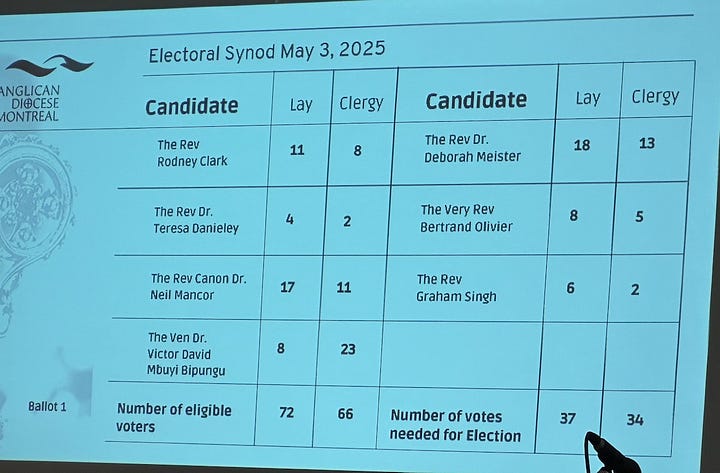
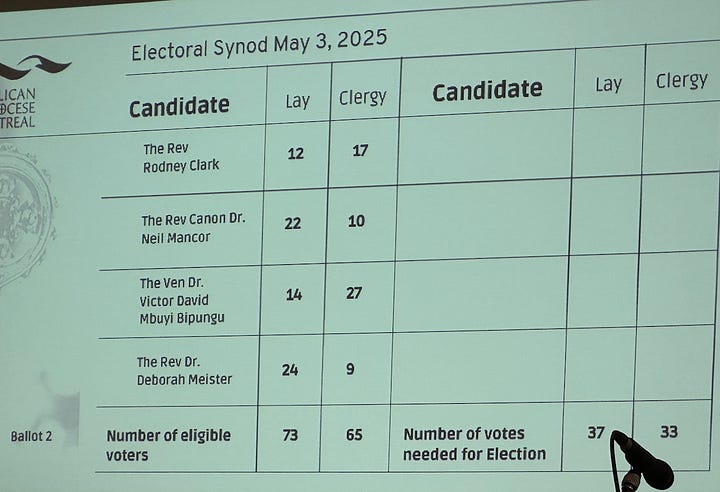
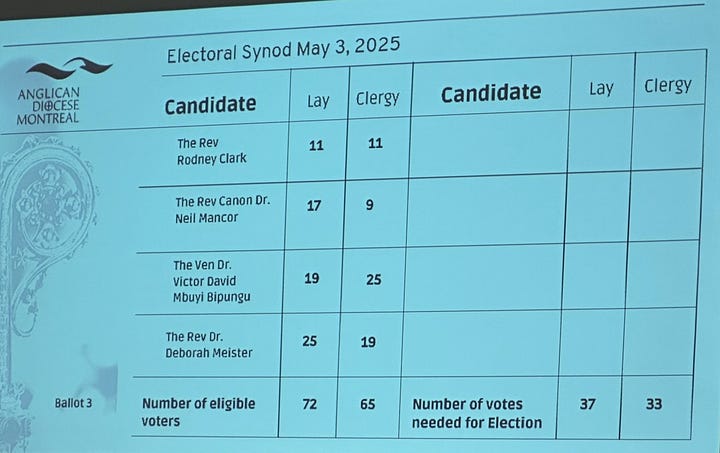
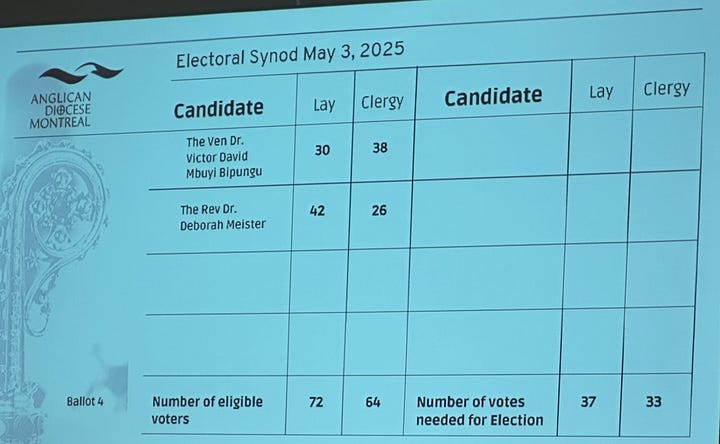
And to all a good night!
The Rev. Canon Jesse Zink is principal of Montreal Dio and canon theologian in the Diocesan of Montreal.
Peter Fenty was an area bishop in the Diocese of Toronto but not a diocesan.
His English is probably better than Mark Carney’s French, for what it’s worth.
I would be happy to be corrected on this.




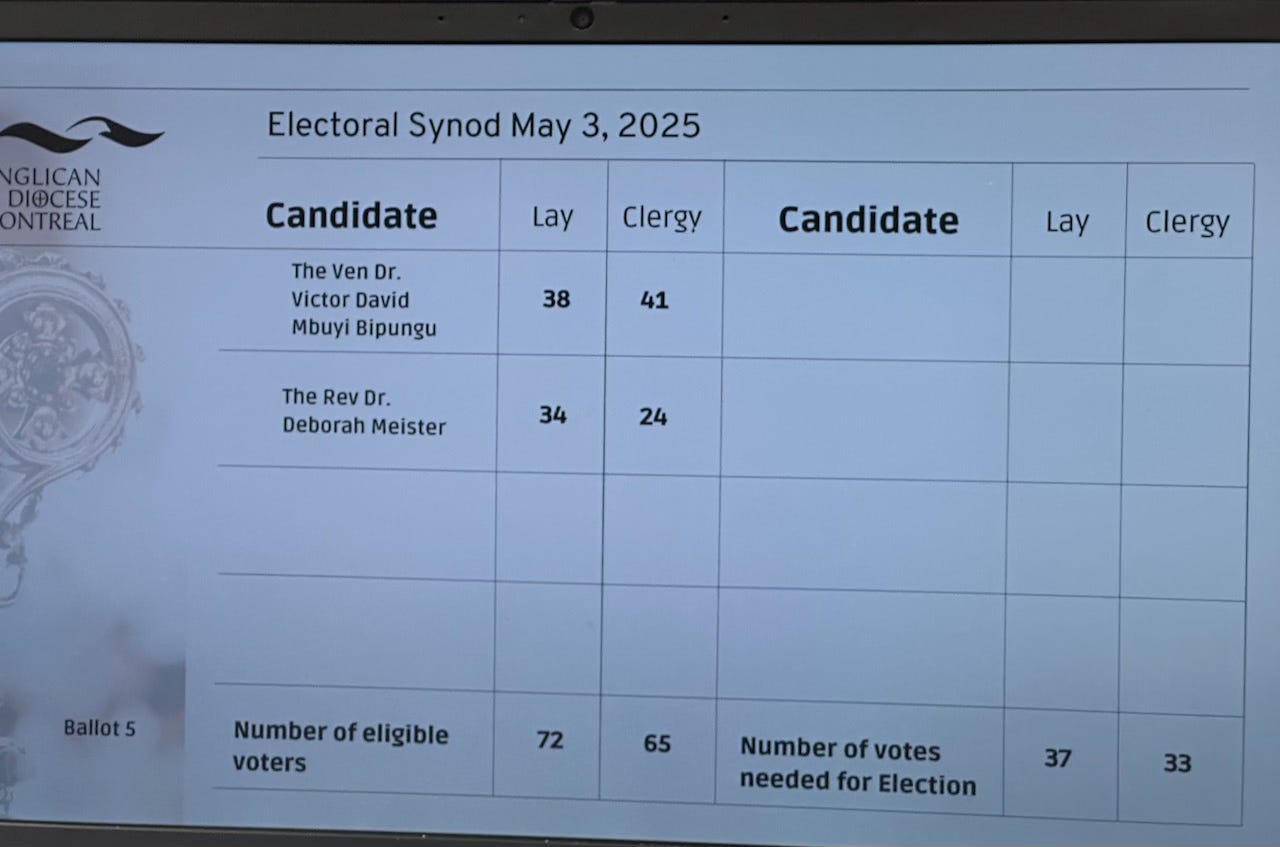
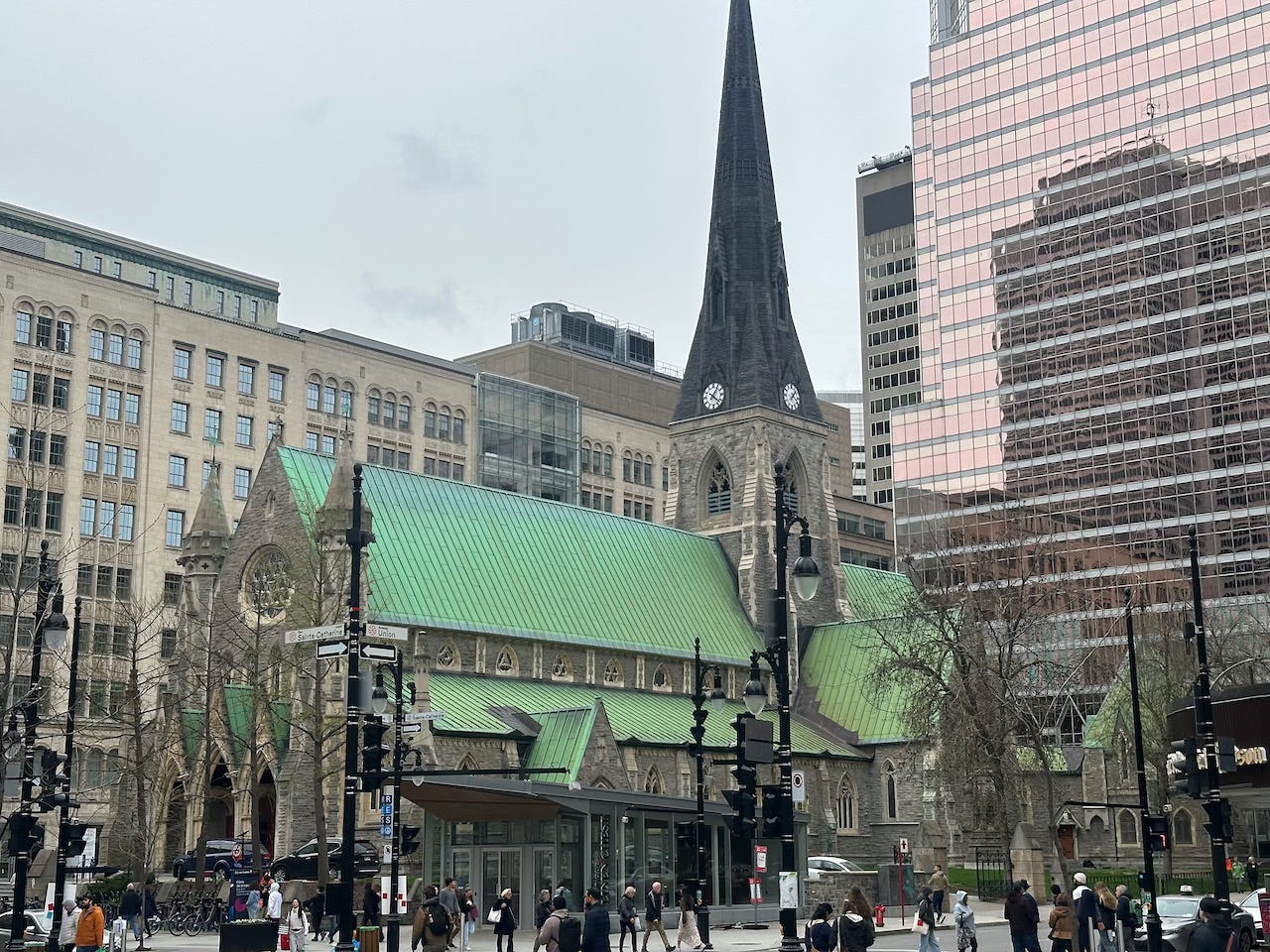
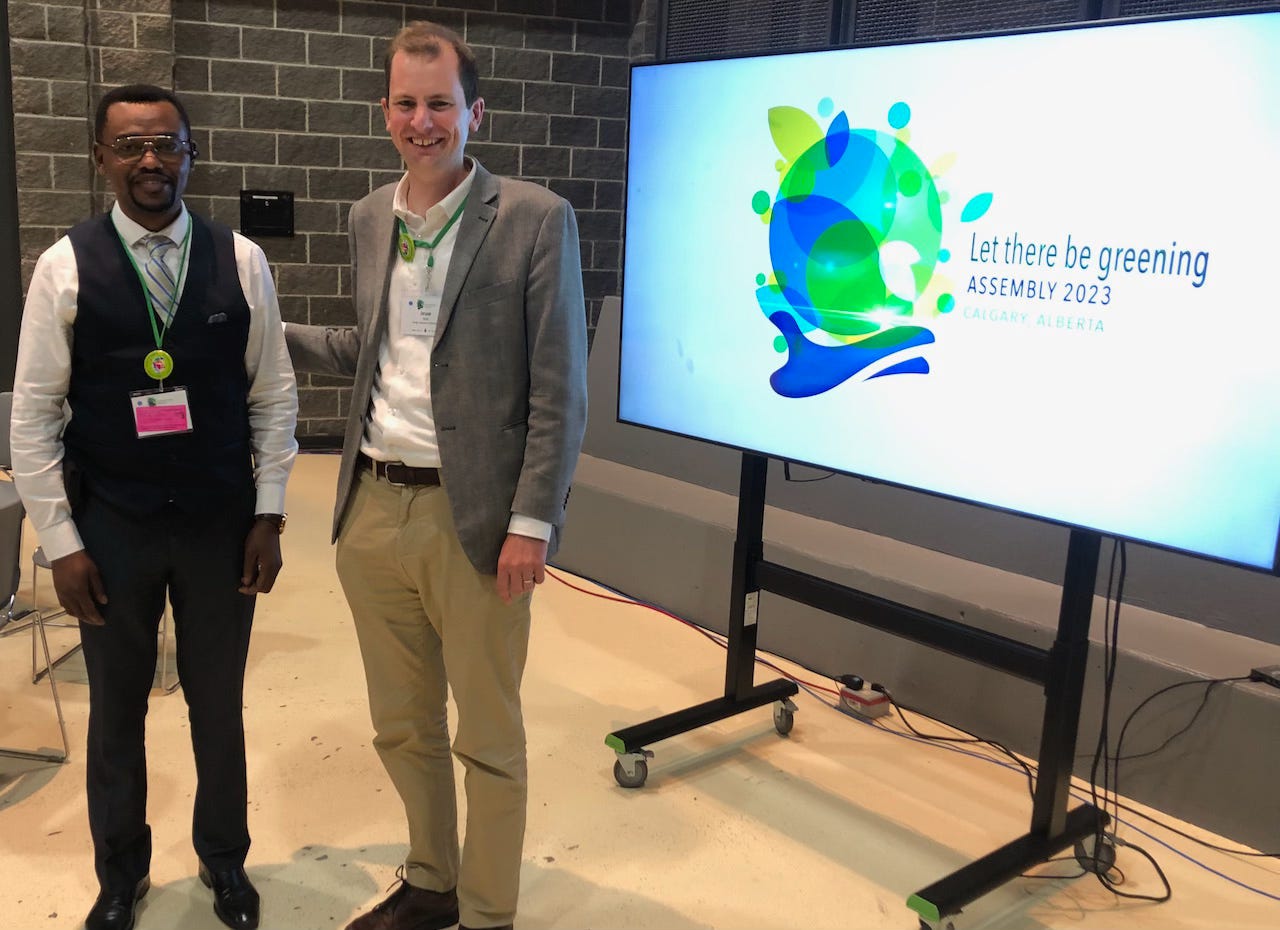
Here is a YouTube link to V-D’s short acceptance speech: https://m.youtube.com/watch?v=fJO-vtCj-X0&pp=ygUPamVhbiBmaWxzIGNoZXJ5
Theoretically, Bp Todd Townshend of Huron must have an earned doctorate.